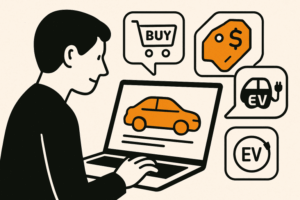Key Takeaways
- Online platforms are revolutionizing the car-buying experience, offering convenience and transparency.
- Electric vehicles (EVs) are gaining traction, driven by environmental concerns and technological improvements.
- High interest rates and economic factors are influencing purchasing decisions and financing options.
- Consumers are prioritizing value, leading to increased interest in certified pre-owned vehicles and affordable models.
Introduction
The car buying landscape is defined by innovation, changing consumer values, and significant shifts in how vehicles are purchased and financed. As digital solutions become mainstream and economic pressures guide buyer choices, dealers and customers must adapt to these modern shopping behaviors. For those who want a seamless experience and up-to-date inventory, Learn more about the latest options in new vehicles, which showcases how the car buying process has evolved for today’s consumer.
Digital retail has minimized many traditional pain points, empowering buyers to shop on their own terms. With instant comparisons, transparent pricing, and flexible delivery, online tools now define the competitive edge in automotive retail. The entire car shopping journey, from researching features to arranging home delivery, can often be completed without stepping inside a dealership.
The Rise of Online Car Shopping
The shift from physical dealerships to digital platforms has significantly impacted car buying, with consumers now controlling the entire process online. Virtual showrooms, 360-degree vehicle tours, and at-home test drives offer transparency and comfort, saving time and enabling buyers to negotiate better. Digital platforms also offer easy trade-in appraisals and instant loan pre-qualification, reflecting the growing demand for convenience in automotive transactions. Over half of today’s car shoppers start their journey online, emphasizing the importance of digital-first strategies for buyers and sellers.

Electric Vehicles Gain Momentum
The rise of electric vehicles (EVs) is a transformative trend in the automotive market due to climate change concerns, battery efficiency improvements, and increased vehicle range. Consumers have a wider range of electric options, including family-friendly SUVs and high-performance sedans. Public charging stations are increasing, reducing range anxiety. Government incentives and industry commitment to electrification support this transition. EVs now make up a significant portion of new vehicle sales, reflecting technological advancements and shifting social attitudes towards sustainability.
Economic Factors Influencing Purchases
High interest rates and inflation have complicated car-buying, affecting monthly payments and affordability. Buyers are now prioritizing value for their investment, increasing demand for certified pre-owned vehicles. Dealers are expanding their inventory and offering innovative financing options to accommodate diverse budgets. Buyers also consider total ownership costs, including insurance, maintenance, and depreciation, to ensure their decisions align with their needs and long-term financial goals.
Preference for Value-Oriented Brands
Consumers prioritize brands known for reliability, practicality, and affordability in a landscape marked by tighter budgets. Rather than chasing luxury, shoppers gravitate toward established automakers with reputations for value. Toyota, for example, has seen a significant uptick in popularity for its blend of quality, cost-effectiveness, and fuel efficiency. This movement underscores a broader trend: buyers want lasting value, low running costs, and minimal repair risks over flashy upgrades, bells, and whistles.
Integration of Advanced Technologies
The 2024 model year introduces advanced tech features like ADAS, infotainment, and smartphone integration. These features enhance safety and comfort, particularly among tech-savvy consumers. However, these advancements also increase vehicle costs, prompting buyers to consider their driving habits carefully. The balance between luxury and necessity is crucial in purchasing decisions, as tech-equipped models often command a premium.
Shift Towards Subscription Models
Flexible car subscription services are gaining popularity. These services allow consumers to enjoy driving without the burdens of ownership. These monthly plans typically include essentials like insurance, maintenance, and roadside assistance, letting subscribers switch models as their needs evolve. As urban lifestyles demand more flexibility, subscriptions are increasingly considered a practical alternative, especially among younger urban professionals and families with changing transportation needs.
Increased Demand for Used Vehicles
With new car prices on the rise, many consumers are exploring the pre-owned market. High-quality used vehicles, especially those with low mileage and service history, are in heavy demand. This trend makes it essential for buyers to conduct thorough research, ensuring they understand not only vehicle history but also current market conditions such as availability, pricing trends, and warranty options. Buyers should use resources like Consumer Reports to navigate the complexities of used car shopping confidently.
Final Thoughts
The modern car buying experience is defined by digital convenience, greater value consciousness, and a shift toward sustainable and flexible mobility. As buyers adapt to new tools and evolving market realities, staying informed about trends and leveraging reliable resources ensures more successful, satisfying, and financially sound vehicle purchases.








